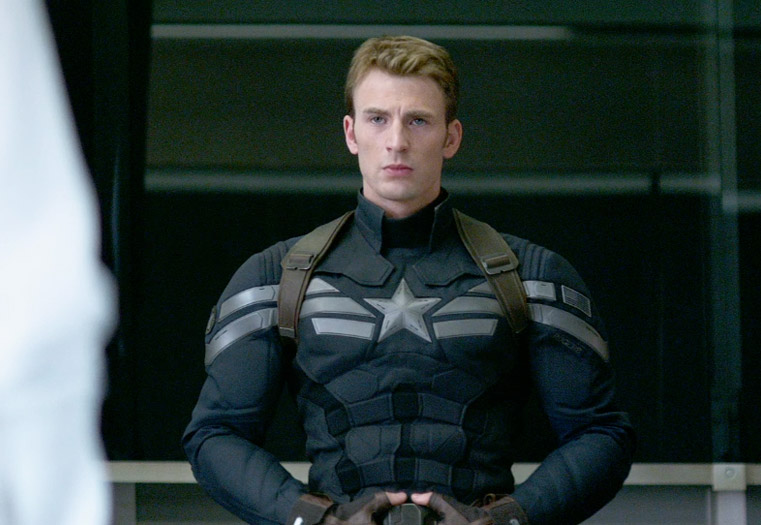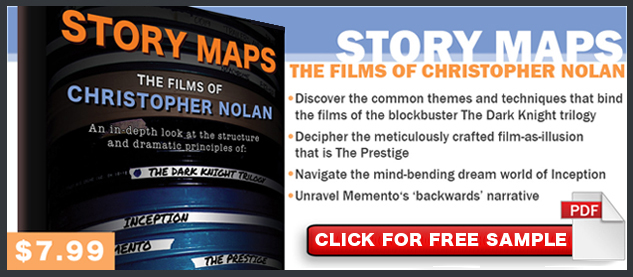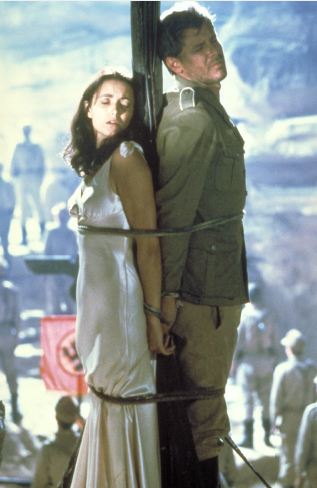Steve Rogers: A Man Out Of Time (before and after seeing CAPTAIN AMERICA: THE WINTER SOLDIER)
[article first published in ScriptMag]
One of my favorite lines from THE AVENGERS occurs when Black Widow tells Captain America not to mess with Thor and Loki, saying “they’re basically gods.” With no hesitation, Cap replies, “There’s only one God, ma’am, and I’m pretty sure he doesn’t dress like that.” Then he jumps out of a plane.
Steve Rogers, a.k.a. Captain America, is certain he knows how the world works. It’s simple: God and Country. Those were the “rules” back in 1944, when it was the Good Guys against the Bad Guys for the fate of humankind.
But once he woke up in contemporary New York City, he learned a hard truth: the world no longer plays by those rules. There’s a lot more gray than black-and-white, and sometimes it’s even hard to see the red, white and blue through the fog of war. So he struggles to make sense of modern America, even as he is asked to defend it.
Steve Rogers is a man out of time.
That is his defining characteristic, and why we sympathize with him on an emotional level, even as we watch him do incredible things that only a superhero can do. In other words, although most of us can’t identify with the Super Soldier, we can feel for the man. We know he’s going to defeat the bad guys in his constant pursuit of justice, but we don’t know if he’ll ever find inner peace in this new world. Our world. I make that distinction because I think there is a slight sense of audience guilt that goes into the character of Captain America, contributing in a small way to his enduring appeal. In other words, we feel guilty about subjecting Steve Rogers to the mess we’ve made of the planet since he saved it for us.
Cap’s central internal conflict of being “out of time” forms the basis of his dramatic character and the fictional universe built around him, both on the comic book page and on the big screen, as in the newest entry in the Marvel Studios’ movie universe, CAPTAIN AMERICA: THE WINTER SOLDIER. At the time of this writing, I haven’t seen the film yet, but from the ads and media coverage, it’s not difficult to see why the screenwriters of Winter Soldier chose the major elements they did – it all flows from Steve Rogers’ defining characteristic.
Let’s look at how writers Christopher Markus, Stephen McFeely and Ed Brubaker may have constructed this narrative, drawing from classic elements established by Cap’s creators, Joe Simon and Jack Kirby. Remember, DRAMA = CONFLICT, so we can’t go easy on ol’ Cap. Consider these three goals for building a “Basic Story Map” for an existing superhero:
- Generate and escalate conflict as much as possible.
- Stay true to the character.
- Challenge the hero in new ways.
Not an easy task. Here’s what they came up with.
[SPOILERS AHEAD]
The villain is a former friend from Steve’s past, but he’s been turned to the other side. A good guy become bad, and ostensibly through the same chemical process that turned weakling Steve Rogers into Captain America. Bucky Barnes, the “Winter Soldier,” is literally Cap’s opposite, his dark mirror-image or “shadow.”
Steve’s (rumored) love interest is Natasha Romanoff, a.k.a. The Black Widow, a woman with a lot of skeletons in her closet — it’s suggested that she has used her body to complete missions in the past – a stark contrast from Steve Rogers, a “boy scout” with no past indiscretions. (A question arises: Is Captain America still a virgin? A quick Google search reveals I am not the first person to ask.)
Captain America is driven by an incorruptible sense of justice. He’s always going to do the right thing for the right reasons…which can be dramatically boring. So how do you build a plot and a transformative arc? You put him in situations where he is faced with the challenge of compromising his code of justice or an innocent will be hurt. You wallop him with an impossible choice.
Cap must break the rules or someone will die. Now, what if that someone was close to him? Maybe a love interest, or even more difficult, a former friend that has been corrupted? In other words, look for the movie to put Natasha and Bucky in situations where they will die if Cap does not act…but to act means a set of consequences that the “old” Steve Rogers would never risk. In the climax, I’m guessing that it will come down to Cap deciding to kill Bucky or not. Whether the writers ‘go there’ and Cap takes him out remains to be seen; if they do, there will no doubt be a strong fan reaction. (Recall the controversy over Superman killing Zod in Man of Steel.)
To throw fuel on the fire, we know from the trailers that Cap will be hunted by his own people – after Cap uncovers corruption within S.H.I.E.L.D., implicating (I assume) the politician at the top of the organization (played by Robert Redford), Cap must evade capture long enough to reach his goal. In other words, Captain America must fight America!
My prediction: I have this notion that after battling a corrupt system, Steve Rogers may choose to affect change from within the system by running for office. That would be a fun cliffhanger ending – Steve Rogers announces his candidacy for U.S. Senate. Of course, with The Avengers II coming up in 2015, we know he won’t stay in a business suit for long.
UPDATE: I’ve seen the movie!
Firstly, I loved it. The tone was unique from the other Marvel movies. More serious, less comedic relief, more focused on spy craft and physical action set pieces, not unlike a Bond film. Comparisons have been made to 1970s political thrillers, and I don’t think that’s too far off. The action set pieces were incredible on the big screen.
As for my analysis and “predictions” above, here’s how I stacked up to the finished movie:
- Cap doesn’t end up running for office in this film, although I still hold out hope that The Avengers: Age of Ultron introduces Steve Rogers as a U.S. Senator, and his new position not only affords him access to more government secrets, but it also puts him at the mercy of party politics and media watchdogs. Perhaps he’s taken the seat vacated by that snake played by Garry Shandling. We shall see.
- The “man out of time” aspect of Steve Rogers was emphasized even more than I thought it would be! It permeates every relationship he has, including that of his new sidekick, Sam Wilson, a.k.a. The Falcon, a modern war vet who works with PTSD sufferers. Although decades may separate their wars, Steve and Sam bond over the issues only a vet would understand, like not being able to sleep on a soft bed. The climax finds a great visual motif to support this theme – Steve Rogers steals his original Captain America suit from the Smithsonian and wears it into battle against the Winter Soldier. Speaking of…
- The climax does indeed come down to Cap deciding whether or not to kill Bucky/Winter Soldier. Ultimately, Cap tries to get through to Bucky, and judging by the post-credits scene, he may have been successful. Will Bucky Barnes be joining The Avengers? I hope so.
- Alas, Natasha Romanoff (Scarlett Johansson) is not a love interest. Which, for the record, sucks. Why can’t Cap and Black Widow just kiss and get it over with, already?! Maybe Natasha and Bruce Banner struck up a romantic relationship after they bonded in The Avengers? But I think Cap and Black Widow make a more organic, and sexier, couple. They sure do flirt a lot. I mean, get a room, you two, am I right?
If you’re looking for more analysis of Captain America: The Winter Soldier, including a Full Story Map of the film, then I invite you to sign up for my upcoming webinar, “Writing The Superhero Movie!” with The Writers Store, which goes live on May 15, 2014 and will be archived later in case you can’t make the live call. The webinar also includes a LOGLINE CRITIQUE by me AND Hollywood lit Manager Lee Stobby! Come up with your own original superhero concept and get it evaluated by two industry professionals.
Good Luck and Happy Writing,
Dan Calvisi
Related: The Dark Knight Rises free story map and podcast
Related: Making Everyone Happy All At Once: Writing a Summer Blockbuster
 “Dan has a no-nonsense approach to screenplay analysis that cuts through the bull and delivers the goods. A must read for serious screenwriters.”
“Dan has a no-nonsense approach to screenplay analysis that cuts through the bull and delivers the goods. A must read for serious screenwriters.”
-J. Stephen Maunder, Writer/Director
“…as much as an analysis of Nolan the filmmaker as it is an analysis of story structure within his films.”
-Script Magazine




Leave a Reply
Want to join the discussion?Feel free to contribute!